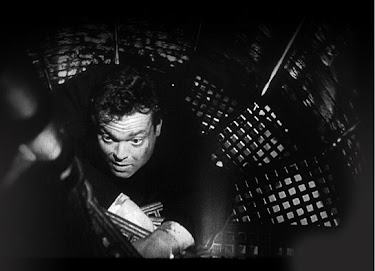Written by: Ben Ames Williams (novel), Jo Swerling (screenplay)
Starring: Gene Tierney, Cornel Wilde, Vincent Price, Jeanne Crain, Mary Philips, Gene Lockhart, Darryl Hickman
I don't think I agree with those who have designated Leave Her to Heaven (1945) a film noir. This Technicolor picture – and it's surprising how much the presence of colour can distort the tone of a film – feels much closer to the claustrophobic domestic melodramas of the same period, such as Hitchcock's Rebecca (1940) and Suspicion (1941), and Cukor's Gaslight (1944). But there's one important difference. By reversing the gender roles, and placing the power in the hands of the wife, director John M. Stahl here creates a formidable femme fatale, personified by the lovely and luminous Gene Tierney. The vibrant Technicolor photography is certainly pleasing to the eye, and the saturated colours add a perhaps-unintended touch of the surreal, but the dazzling colour palette distracts from and obstructs the film's darker themes. As much as I wouldn't like to deprive myself of Tierney's sparkling green eyes, I think that, in terms of atmosphere, Leave Her to Heaven would have worked better in black-and-white.

 Tierney's character initially elicits an amount of sympathy, especially given Richard's apparent inability to recognise his wife's desperate need for privacy and intimacy in their relationship. However, it doesn't take long before her behaviour, fuelled by suspicion and paranoia, becomes entirely contemptible, and there's no longer any trace of the charming enchantress we saw in Laura (1944). Ellen's psychosis is an intriguing one: she was obviously obsessed with love for her own father – what Freud called "feminine Oedipus attitude," or Electra complex – and, following his death, subsequently fell in love with Richard, who bears a remarkable resemblance to him. Such is her passion for her father, through Richard, that she cannot bear to share him with anybody; thus, her mania stems from the simple notion that "she loves too much." Ellen's murders are shocking in their own low-key simplicity, and Tierney, who received her only Oscar nomination for the role, carries out her evils with an icily-impassive face. But, geez, even this chilling portrayal can't make me stop loving her.
Tierney's character initially elicits an amount of sympathy, especially given Richard's apparent inability to recognise his wife's desperate need for privacy and intimacy in their relationship. However, it doesn't take long before her behaviour, fuelled by suspicion and paranoia, becomes entirely contemptible, and there's no longer any trace of the charming enchantress we saw in Laura (1944). Ellen's psychosis is an intriguing one: she was obviously obsessed with love for her own father – what Freud called "feminine Oedipus attitude," or Electra complex – and, following his death, subsequently fell in love with Richard, who bears a remarkable resemblance to him. Such is her passion for her father, through Richard, that she cannot bear to share him with anybody; thus, her mania stems from the simple notion that "she loves too much." Ellen's murders are shocking in their own low-key simplicity, and Tierney, who received her only Oscar nomination for the role, carries out her evils with an icily-impassive face. But, geez, even this chilling portrayal can't make me stop loving her.7/10
Currently my #5 film of 1945:
1) The Lost Weekend (Billy Wilder) *
2) Spellbound (Alfred Hitchcock) *
3) Brief Encounter (David Lean)
4) 'I Know Where I'm Going!' (Michael Powell, Emeric Pressburger)
5) Leave Her to Heaven (John M. Stahl) *
6) Scarlet Street (Fritz Lang) *
7) Tora no o wo fumu otokotachi {The Men Who Tread on the Tiger's Tail} (Akira Kurosawa)





_poster.jpg)


No comments:
Post a Comment